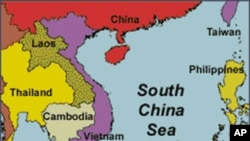The South China Sea has long been a disputed region. China claims the waters. But, many other nations have called various islands and areas of the sea their own. The United States also has a long history in the South China Sea to the dismay of China.
Recent tensions in the South China Sea were discussed in Washington at a recent forum held by the private Center for Strategic and International Studies (CSIS).
Kurt Campbell, the Assistant Secretary of State for East Asian and Pacific Affairs, says the United States wants to keep the heavily-used area for international commercial shipping free and safe.
"What we have seen, in recent years, is the South China Sea is really a vast area of ocean in which there have been for decades, generations, and conflicting, overlapping planes of sovereignty. The traditional U.S. position has been one that we do not take a position on sovereignty and, indeed, we are not a claimant in these waters. But, we have a very strong national interest in maintaining freedom of navigation and freedom of the seas," he said.
China has said it claims sovereignty over the entire South China Sea. But, former Ambassador Stapleton Roy, who is the Director of the Kissinger Institute on China and the United States, says China may have internal political disagreements regarding the South China Sea.
"The Chinese do not speak with precision about the South China Sea. Some Chinese make claims that are not documentable in terms of official actions by China. The use of the term "core interest," I can show you Chinese language material that refers to the South China Sea as a core interest. There is no official Chinese public statement making it a core interest," he said.
Ambassador Roy says the outward policy by China has been inconsistent with the exception of claiming total sovereignty over the area.
"Internally in China, there has been pushback against a too-soft policy that was not adequately defending China's interests in the South China Sea. Now, it's very difficult to understand the Chinese position on the South China Sea. The only thing that is crystal clear about it is that they believe they have indisputable sovereignty over the South China Sea area," he said.
That belief has created tensions and sometimes conflict in the water. Kurt Campbell says the activities in the South China Sea are not limited to commercial shipping and fishing.
"The truth is that many states operate actively in the South China Sea. There are militaries, the Chinese have many exercises, as do we (the United States), as do the Indonesians, the Malaysians, the Vietnamese and other (countries)," he said.
Ambassador Stapleton Roy says, even with tensions in the area, most countries are seeking to work with the United States to maintain calm on the seas. "I do not sense deep alarm because they do not think it is going to get out of control. But, if anything it has increased a desire on their part for greater solidarity with the United States. That is not something that we have to push. That is something that they are pulling on," he said.
Assistant Secretary of State Kurt Campbell says the solution will come from talks with all nations involved in the South China Sea.
"Ultimately, as China expands its activities, military and otherwise, they will come in contact with the United States more and more. It is in U.S. interest, and indeed in Chinese interests, and the interests of the other countries in the Asian-Pacific region, that our countries work more closely together to establish rules of the road, create greater confidence about what our expectations are - that is what we are seeking to do with sustained dialogue," he said.
China has said the United States should not be involved in regional disputes over the South China Sea. But, Campbell says the people of Asia want U.S. involvement.
"American ingenuity, American inventiveness, the openness of the American labor market, you could go through all of our weaknesses, but I would stack it against our strengths anytime. And, I think there is a general recognition that you underestimate American power at your peril. And, I think it is the duty of this generation of Americans to fulfill that optimism that Asians have in us, frankly, sometimes more than we have in ourselves. If you really want to hear good news and a sense of what America can accomplish, talk to young people in Asia," he said.
The most recent incident in the South China Sea involved China detaining a Vietnamese vessel accused of fishing with explosives. Vietnam denied the charge and demanded the boat's release. China freed the boat from a Chinese port on October 11.
A Chinese patrol boat later towed the vessel to the disputed Paracel archipelago after its engine failed. The small chain of islands is claimed by China, Vietnam and Taiwan.
Turbulence Remains in South China Sea





